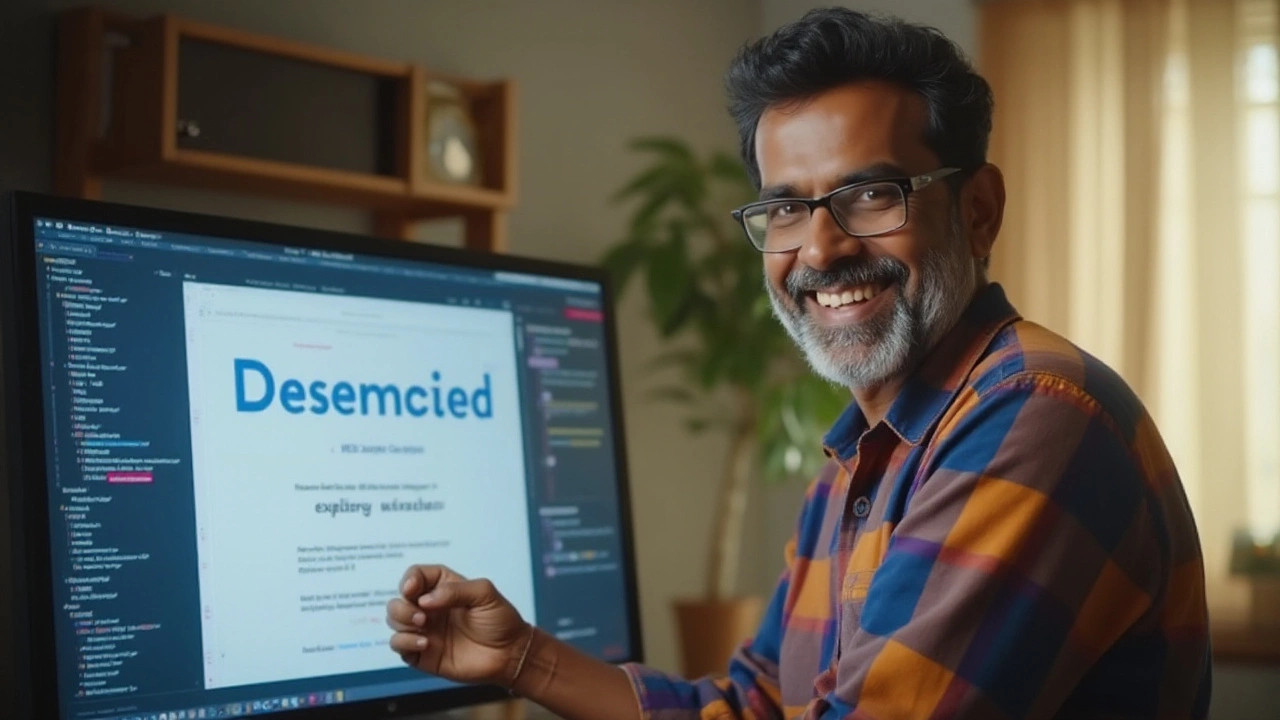
Imagine building a prosperous career and achieving a $75,000 annual income, all without stepping foot into a college lecture hall. The digital era has handed us tools to redefine what it means to be qualified for high-paying roles. One of the most versatile tools at our disposal? Online courses.
Whether you’re interested in tech, creative fields, or entrepreneurship, there’s a range of subjects where passion, skill, and tenacity overshadow traditional degrees. This exploration will guide you through fields teeming with potential, help you select impactful courses, and navigate platforms that cater to diverse learning needs.
Let’s embark on a journey to uncover how online education not only matches but sometimes even exceeds the opportunities offered by college degrees in reshaping one's career trajectory.
- The Rise of Online Learning
- Lucrative Fields With Skill Demand
- Choosing the Right Courses
- Platforms to Explore
- Crafting Your Success Story
The Rise of Online Learning
Over the past decade, online learning has undergone a remarkable transformation, reshaping how we acquire knowledge and skills. What started as a novel idea has become an integral part of the educational landscape. Today, online courses are not just supplements to traditional learning but alternatives that can stand on their own merit. This shift is largely attributed to the flexibility and accessibility that online education offers. Learners from all walks of life, regardless of geographical barriers, can now access high-quality education from institutions around the world. The reach and demand are evident, with platforms like Coursera and Udemy boasting millions of users globally. The significant growth in this domain signals a clear trend: online learning is being taken seriously, not just by individuals, but by employers who now recognize courses from reputable platforms as legitimate credentials.
The advancement in technology has played a pivotal role in fueling the growth of online learning. High-speed internet and the widespread use of smartphones and tablets mean that learning is no longer confined to the classroom. Interactive platforms with features like live lectures, peer discussion forums, and virtual laboratories are creating immersive experiences that rival traditional education settings. This technological leap has made it possible for anyone to transition from a complete novice to a qualified professional in fields increasingly reliant on specific skills rather than degrees. Interestingly, a report by the World Economic Forum reveals that over 50% of employees will need reskilling by 2025, which further emphasizes how important platforms and online courses have become.
Online learning is democratizing education, breaking down barriers that once limited access to knowledge. This method allows learners to personalize their education according to their schedules and learning paces, making it particularly appealing to working professionals looking to upgrade their skills. Notably, students can choose from a myriad of subjects, ranging from data science to creative writing, often taught by top experts in their fields. This era of result-oriented learning favors the practical application of knowledge rather than rote memorization, which aligns with what employers are increasingly seeking.
"The great irony here is that, while critics once derided online education as second-rate, the leading employers have now recognized its course graduates as some of the most prepared candidates," says Henry Bass, an educational technologist.
To better understand the scale of this transformation, consider a recent survey that highlighted how nearly 70% of students and recent graduates believe that online learning has not only made education more accessible but has also given them a competitive edge in the job market. This has prompted many universities to offer online versions of their degrees, increasing credibility and value in the eyes of potential employers. The options are endless—whether it’s enrolling in an immersive coding bootcamp or pursuing a series of short courses, individuals can strategically position themselves to meet market demands.
In conclusion, the rise of online learning is a response to a world that is increasingly reliant on innovation and flexibility. By enabling learners to gain skills and knowledge with minimal constraints, online education is leveling the playing field for those without access to traditional educational avenues, and is an essential ingredient for anyone aiming to make a substantial income without a college degree. The trends suggest that this form of learning is not just a fad but a significant component of the future educational paradigm.
Lucrative Fields With Skill Demand
The digital age has shifted the landscape of employment, emphasizing skills rather than degrees in many high-paying sectors. If you’re looking to step into roles that require more technical talent and creativity than formal education, you’re in the right era. One sector that springs to mind is technology, particularly areas like software development, data analysis, and cybersecurity. Take software development, for instance; it remains one of the most sought-after skills globally, as businesses continue their digital transformations. Professionals in this field often don’t need more than certifications from a few intensive programming courses to land well-paying jobs.
Another promising area is digital marketing. With the rise of online courses, more people can master tools and strategies to help businesses amplify their online presence, a fundamental need in today’s market. Jobs in SEO, social media management, and content creation offer flexibility and attractive pay packages, with or without a college degree. The eCommerce industry also provides numerous opportunities, as selling online has become mainstream for businesses of all sizes. Expertise in eCommerce platforms can lead to significant returns, especially as you develop strategies to drive sales.
Exploring Creative Avenues
Creative fields are not far behind in offering lucrative opportunities. Graphic design, video production, and user experience design are popular domains where technical skill can propel careers to new heights. Websites and apps are competing for users’ attention, and the demand for appealing visuals and intuitive designs is at an all-time high. Many successful designers are self-taught through online courses, mixing creativity with technical skills to produce compelling work. Consider learning tools like Adobe Creative Suite or mastering UX/UI design principles if this path interests you.Entrepreneurial Ventures and Freelancing
Outside the traditional employment sphere, freelancing and entrepreneurship provide pathways to financial success without requiring formal education. With platforms like Fiverr, Upwork, and Etsy, individuals can leverage unique skills to reach a global market. These platforms have democratized work opportunities, allowing anyone with a computer to offer services ranging from writing, graphic design, consulting, to developing apps. There's no formal degree needed, just a strong portfolio and the ability to market oneself convincingly.A report by the World Economic Forum highlighted this trend, noting that "75% of business leaders stated critical thinking, communication, and collaboration—skills that can be gained outside the traditional classroom—are equally as important as technical hard skills." This underscores the importance of a proactive approach to learning and skill acquisition.
In summary, the landscape is rich for those willing to glean skills from non-traditional avenues. The path to a $75,000 income is paved with possibilities in fields with skill demand, waiting for those who are determined to harness them through online courses and a drive to excel.

Choosing the Right Courses
In the quest to make $75,000 a year without a traditional college degree, selecting the right online courses is vital. This doesn't solely hinge on the allure of popular subjects but requires a strategic approach. It's not just about picking what's trendy; it's about aligning with your career goals and passion. Whether you aim for a lucrative role in tech or a creative field, being intentional in your choices can bridge the gap between mere potential and actual success.
First, identify which skills are most in-demand in your chosen field. Start by researching job boards and company postings to understand the specific requirements employers are seeking. This market-driven approach ensures you're not only learning but also preparing for real-world opportunities. Next, consider your existing skills and how you can build upon them. This process of skill stacking helps you create a unique personal brand that stands out in the digital marketplace.
Diversifying your learning sources is also a smart move. Platforms like Coursera and edX offer a broad curriculum, while specialized sites like Udacity and Pluralsight provide deep dives into tech and IT skills. Recognize that not all platforms are created equal — each has its strengths and areas of specialization. Comparing content and teaching styles can help you find the perfect fit. This kind of due diligence is essential to maximizing the value of your investment, both in terms of time and money.
Certifications play a critical role in validating your skills. Yet, not every course offers recognized credentials. Seek courses that provide industry-recognized certificates, or better yet, partnerships with universities and companies. Credentials like Google IT Support Professional from Coursera or AWS Certified Solutions Architect can significantly increase your employment prospects. They signal to employers that you have received training aligned with industry standards.
Emphasizing lifelong learning gives you a competitive edge. The dynamic nature of online courses allows you to update your skills continually, pivoting as the job market evolves. This adaptability is a key asset in navigating the turbulent waters of the modern economy. A quote attributed often to Alvin Toffler encapsulates this ethos well: "The illiterate of the 21st century will not be those who cannot read and write, but those who cannot learn, unlearn, and relearn."
Some essential steps to guide you in choosing courses include assessing testimonials, course content previews, instructor qualifications, and community feedback. Online forums and social media groups related to your field of interest are excellent places for gaining authentic insights. Moreover, many platforms now allow for a trial period or offer a refund policy which you can leverage to ensure the course meets your expectations. Armed with this knowledge, you're better positioned to make informed decisions about your online education path.
Platforms to Explore
The digital landscape is brimming with platforms that empower individuals to embark on educational journeys leading to a fruitful career, especially if you're aiming for that coveted $75,000 income without a formal college degree. Among the vast sea of online educational resources, selecting the right platform can significantly influence your success. Let's dive into some of the most impactful platforms that have stood the test of time in terms of quality, accessibility, and industry recognition.
One of the giants in the online learning sector is Coursera, which partners with top universities and companies worldwide to provide courses that range from data science to creative writing. With options for individual courses, professional certificates, and even full-fledged degree programs, Coursera offers flexible learning paths that cater to diverse career ambitions. Perhaps one of its greatest strengths lies in its collaborations with industry leaders, ensuring that course content aligns with current marketplace demands.
Then there's Udemy, renowned for its vast library where anyone can publish a course, making it a treasure trove of both foundational learning and niche, industry-specific skills. What sets Udemy apart is its user-friendly interface and constant addition of new courses. The platform regularly offers significant discounts, making it an attractive option for learners on a budget who wish to dabble in multiple disciplines until they find their forte. While the quality may vary since instructors are not vetted like on Coursera, reviews and ratings usually help prospective students discern where to invest their time.
"In today's workforce, the emphasis is shifting from traditional education credentials to the actual skills one can bring to the table," explains Linda John, a leading authority in digital learning transformation.
For those interested in technology-specific roles, platforms like Codecademy and Khan Academy offer comprehensive courses that focus on programming, web design, and other technical skills critical for the tech industry. Codecademy, in particular, stands out with its interactive learning approach where users can write code directly into the platform's interface, making coding less abstract and more hands-on. Online courses here are designed to accommodate all levels, from beginners to advanced learners seeking specific industry certifications.
Meanwhile, edX, another powerhouse, provides thousands of courses from top-tier universities like Harvard and MIT. It is well-known for its massive open online courses (MOOCs) that anyone can join, most of which are free though options for paid certificates are available. edX is unique in its structured learning format, similar to a traditional college course, which might appeal to those who thrive on accountability and schedule.
Finally, LinkedIn Learning (formerly Lynda.com) caters to professionals eager to enhance their skill set with short, skill-based courses. These are designed for busy individuals who need to balance learning with ongoing professional commitments. Its integration with LinkedIn profiles allows learners to showcase completed courses, providing potential career advancement opportunities and networking possibilities.
These platforms collectively embody the profound potential of online learning. They offer paths that not only bypass the need for expensive college degrees but also equip learners with highly sought-after skills, paving the way to lucrative career opportunities in the modern economy.

Crafting Your Success Story
Creating a path to financial success that doesn’t rely on a college degree might seem daunting at first. However, with the right strategies and tools, it becomes a considerable pursuit anyone can undertake. Central to this journey is understanding the vastness of the online courses landscape. The courses are not just about learning; they form the bedrock of a new story you craft for your career. Equipping yourself with these skills can bridge the gap between high-income potentials and traditional limitations.
The first step is solidifying your mindset. Often, the greatest hindrance is not the lack of a degree but the absence of belief in your potential to learn continuously. Malcolm Gladwell, in his defining bestseller, spoke about the 10,000-hour rule, pointing out that dedication and focus can perfectly mold one's mastery in any field. Transferring this concept to self-led learning through online platforms can be transformative.
With this prepared mindset, tangible actions must follow. Begin by defining what success means to you. Is it confined to a dollar figure, or does it include flexibility, work-life balance, and job satisfaction? Reflect on your passions and areas where you are naturally inclined to excel as these are likely to sustain your motivation through the peaks and valleys of this journey. Passion intertwined with a market demand can be a powerful combination.
Next, identify and list specific skills that are in demand within your chosen field. Researching the job market trends is essential. The Bureau of Labor Statistics and similar resources can offer insights into which skills are projected to grow in demand. Some industries, like technology and digital marketing, are seeing exponential growth and a relentless demand for specific skill sets. In these areas, skills often **outweigh** traditional educational qualifications.
The implementation stage sees the groundwork take form. It's time to enroll in targeted online courses that directly arm you with the required skill sets. Websites such as Coursera, Udemy, or Khan Academy provide myriad courses spanning various sectors. With some courses recognized by industry giants, they can provide a solid foundation for you to enter competitive fields.
Embracing the importance of learning communities should follow next. Spaces like LinkedIn Learning Groups, Reddit forums, and other professional communities give you access to networks that are critical for not only job placement but for continued learning. These connections, despite being virtual, can help shed light on complex topics, offer moral support and guide your practical application of theoretical knowledge.
Over the course of your journey, crafting a personal portfolio will weave your learning experiences into a coherent narrative. Unlike traditional resumes, a dynamic portfolio provides an ongoing presentation of your specific skills and achievements. Use platforms like GitHub for tech projects or Behance for creative work to exhibit your prowess in actual projects or internships done remotely. This digital showcase can often speak louder than a degree.
Applying soft skills such as communication, leadership, and problem-solving in your narrative is just as important as the hard skills you acquire through courses. The Art of Communication—a static-free dialogue delivery—is a skill that, when utilized effectively, enhances personal brand projection and ensures seamless user engagement in your respective field.
Finally, put your newly acquired skills to test. Internships, freelance projects, and volunteering are excellent avenues through which learning transcends from theory to practice. Real-world applications not only offer hands-on experience but enhance your profile in the eyes of potential employers. In a world rapidly acknowledging skills as the new degree, this path is more than viable; it's thriving as a new form of empowerment.





